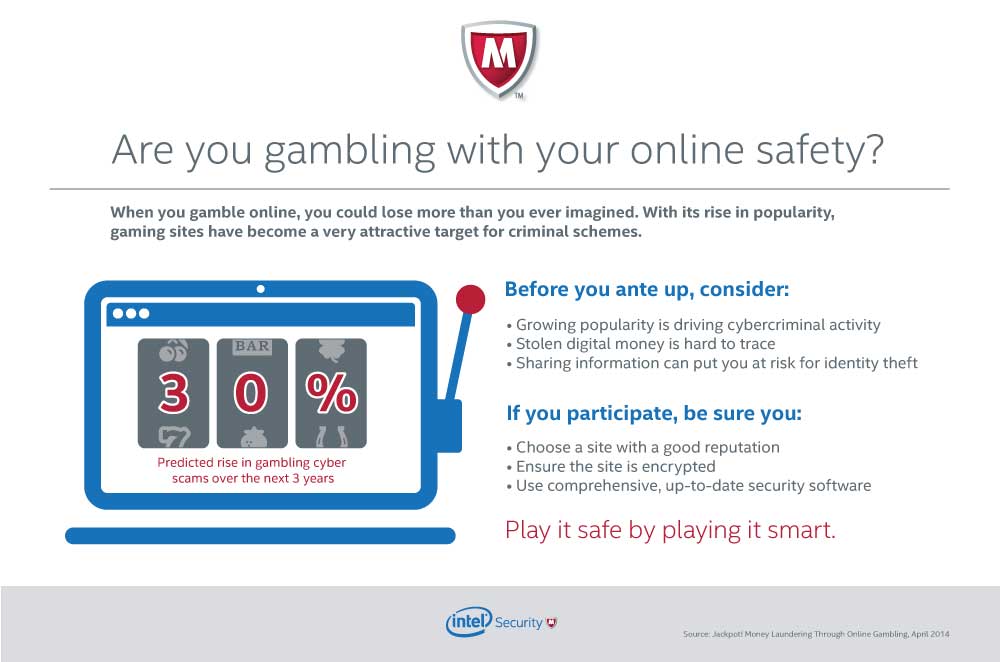In Martin Scorsese’s 1995 film, “Casino,” Robert DeNiro’s character is charged with operating a 1970’s Las Vegas casino for the Chicago mafia. He and his partner in crime (played by Joe Pesci), shake down the strip, skimming millions in casino earnings. The story ends in disaster for the pair—but the film’s plot underlines an important point: the ability to move massive amounts of money through a legitimate business, like a casino, is an effective means to disguise criminal activity.
This fact isn’t lost on today’s hackers and cybercriminals, especially when they need to make profits from the online sale of drugs, weapons, or other black market items appear clean, quickly. Our most recent report, “Jackpot! Money Laundering Through Online Gambling,” discusses this subject at length—looking at the why and how behind cybercriminals’ use of online gambling to launder money made from illegal activities.
Among the report’s primary findings: cybercriminals and hackers are turning to online casinos—an industry set to grow nearly 30% over the next three years—for money laundering. This may sound like something straight out of the movies, but it’s happening everyday. In fact, according to Dr. Ingo Fiedler, a leading researcher of online gambling, roughly $1.6 billion in criminal profits enter the mainstream economy through money laundering every year. And much of this can be linked to the emergence of virtual casinos, which provide crooks with the means to quickly and efficiently “launder” their money
The role of Bitcoin in online money laundering
The emergence of virtual currencies in conjunction with online gambling has enabled cybercriminals to hide the profits from their shady dealings with even greater ease.
The most popular of these virtual currencies is Bitcoin, which I’ve discussed before. Bitcoin is a virtual currency existing entirely on the Internet and allowing for near-anonymous transactions. Bitcoins are stored in digital wallets, which are also anonymous but publicly viewable by everyone. So if Joe Smith sends 15 Bitcoins (worth roughly $8,700 today) to Jane Doe, everyone will be able to see the transaction, but no one will know who owns the wallet or what was bought.
Because of this, Bitcoin has become a lucrative currency for cybercriminals. But quasi-anonymous currency isn’t enough when conducting illegal business in online casinos. When millions are on the line, absolute security is essential. For that, cybercriminals turn to Tor.
The role of Tor in online money laundering
Tor is a free browser that allows you to browse the Internet anonymously. IP addresses, an Internet equivalent to your telephone number, are hidden—along with anything else that may identify you. Tor has proved a useful tool for political dissidents and journalists in oppressive countries, but it’s also very beneficial to hackers in their quest to launder money. That’s because some websites, including online gambling rooms, are only accessible through Tor.
This “dark web”—a segment of the Internet only available through anonymity tools like Tor—makes it nearly impossible to identify either the website’s host, or any of its visitors. This relationship is beneficial for hackers and gambling operators, but for law enforcement officials it’s a huge obstacle preventing identification of criminals. Hence, the “dark web” is where some of the most profitable illegal online gambling operations, and likely money laundering fronts, are taking place.
You may be wondering what all of this means to you. While Bitcoin, Tor and “the dark web” are not immediate threats, they are tools hackers can use to make their jobs easier. Because these tools exist, and are misused, the cost of doing business for hackers is lowered, as are the risks associated with cybercrime. This gives hackers more incentive to go out and propagate more malware, more viruses and more money laundering operations. The end result is more headaches for all of us.
By not protecting your computer from malware and other common threats, you may be accidently assisting a criminal enterprise in their quest to mine Bitcoin or siphon money out an innocent person’s bank account (including your own). Protect yourself from being an unknowing participant in illegal activities with comprehensive security software like McAfee LiveSafe™ service that protects all your PCs, Macs, smartphones and tablets.













